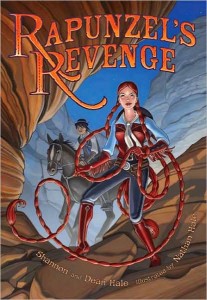 In this extremely entertaining retelling of Rapunzel, the titular character is a feisty, take-no-prisoners girl who uses her extraordinarily-long braids as whips, lassos, and ropes. Together with her new friend, the roguish Jack, she sets out to battle the evil witch, Mother Gothel, whose crimes include terrorizing the landscape, enslaving the locals, and imprisoning Rapunzel in a magic tree for years. Along the way, they’ll battle all sorts of ruffians and dangers, become the best of friends, and maybe even find Rapunzel’s real mother. Skillfully told by Shannon and Dean Hale, Rapunzel’s Revenge is a graphic novel brilliantly illustrated and brought to life by Nathan Hale, making for a lovely, pseudo-Wild West version of an classic fairy tale. This is not to be missed.
In this extremely entertaining retelling of Rapunzel, the titular character is a feisty, take-no-prisoners girl who uses her extraordinarily-long braids as whips, lassos, and ropes. Together with her new friend, the roguish Jack, she sets out to battle the evil witch, Mother Gothel, whose crimes include terrorizing the landscape, enslaving the locals, and imprisoning Rapunzel in a magic tree for years. Along the way, they’ll battle all sorts of ruffians and dangers, become the best of friends, and maybe even find Rapunzel’s real mother. Skillfully told by Shannon and Dean Hale, Rapunzel’s Revenge is a graphic novel brilliantly illustrated and brought to life by Nathan Hale, making for a lovely, pseudo-Wild West version of an classic fairy tale. This is not to be missed.
 Ben is as unlikely a princess as you’ll find, lacking in beauty, charm, composure and training. When her parents are killed, she’s taken in by Queen Sophia, who subjects Ben to a harsh, relentless training regimen in order to make her a proper heir. When that fails, Sophia locks Ben in a tower, out of the way. There, Ben finds a secret room, and begins to train herself in magic, a journey of self-improvement and discovery that will transform her for the better. But will she be able to save her kingdom from exterior threats in the process? Princess Ben is a fun story, with a realistic heroine and an intriguing plot, a well-crafted fairy tale that’s sure to please.
Ben is as unlikely a princess as you’ll find, lacking in beauty, charm, composure and training. When her parents are killed, she’s taken in by Queen Sophia, who subjects Ben to a harsh, relentless training regimen in order to make her a proper heir. When that fails, Sophia locks Ben in a tower, out of the way. There, Ben finds a secret room, and begins to train herself in magic, a journey of self-improvement and discovery that will transform her for the better. But will she be able to save her kingdom from exterior threats in the process? Princess Ben is a fun story, with a realistic heroine and an intriguing plot, a well-crafted fairy tale that’s sure to please.
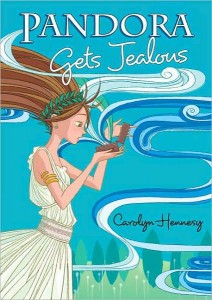 When a school show-and-tell project goes horribly awry, a legendary box is opened and its contents are released, unleashing a host of evils upon humanity. Blamed for the accident, thirteen-year-old Pandora is hauled before the Greek gods themselves to rectify the situation, and given six months to track down the plagues and return them to the box. Assisted by her best friends and given secret guidance from some of the more sympathetic immortals, she embarks upon a globe-spanning, death-defying quest to save the world. Inspired by the famous Greek myth and imbued with some modern teen sensibilities, this is an amusing, entertaining, light-hearted (yet occasionally creepy) story featuring an irrepressible, spunky protagonist and a host of memorable supporting characters. It’ll be interesting to watch Pandora’s adventures in the books to come.
When a school show-and-tell project goes horribly awry, a legendary box is opened and its contents are released, unleashing a host of evils upon humanity. Blamed for the accident, thirteen-year-old Pandora is hauled before the Greek gods themselves to rectify the situation, and given six months to track down the plagues and return them to the box. Assisted by her best friends and given secret guidance from some of the more sympathetic immortals, she embarks upon a globe-spanning, death-defying quest to save the world. Inspired by the famous Greek myth and imbued with some modern teen sensibilities, this is an amusing, entertaining, light-hearted (yet occasionally creepy) story featuring an irrepressible, spunky protagonist and a host of memorable supporting characters. It’ll be interesting to watch Pandora’s adventures in the books to come.
 All her life, Cecilia has been told she’s the rightful heir to Suala, raised in hiding while a decoy lives out her life as princess, until the enemies of the royal family are exposed. When those enemies come for Cecilia, she decides the time is right to reclaim her throne. With her best friend, Harper, in tow, she sets out to do just that, only to discover she’s not the only claimant to the throne, and not all is what it seems to be. In this clever twist on the old “princess in hiding” theme, Haddix brings us a strong-willed, highly capable heroine forced to cope with situations she never could have imagined. It’s a fun read, and a welcome return to the world of Haddix’ Just Ella.
All her life, Cecilia has been told she’s the rightful heir to Suala, raised in hiding while a decoy lives out her life as princess, until the enemies of the royal family are exposed. When those enemies come for Cecilia, she decides the time is right to reclaim her throne. With her best friend, Harper, in tow, she sets out to do just that, only to discover she’s not the only claimant to the throne, and not all is what it seems to be. In this clever twist on the old “princess in hiding” theme, Haddix brings us a strong-willed, highly capable heroine forced to cope with situations she never could have imagined. It’s a fun read, and a welcome return to the world of Haddix’ Just Ella.
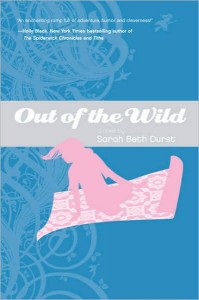 The Wild, the sheer essence of all things fairy tale, is back, and this time it’s not playing fair. Julie, Rapunzel’s daughter, has just gotten used to having her father around, when someone kidnaps Sleeping Beauty, prompting the gallant Prince to fly to the rescue, Julie in tow. As their quest takes them across the country, they find themselves inadvertently committing acts of fairy tale heroism, each new event giving the Wild that much more strength. It’s up to Julie, an ordinary girl in an extraordinary world, to prevent the Wild from conquering America. From New York to Graceland to Disneyland, modern life and fairy tales collide with unexpected results. Clever and highly inventive, this sequel to Into the Wild is full of heart and depth as it re-imagines the old, familiar stories and breathes new life into the characters and tropes.
The Wild, the sheer essence of all things fairy tale, is back, and this time it’s not playing fair. Julie, Rapunzel’s daughter, has just gotten used to having her father around, when someone kidnaps Sleeping Beauty, prompting the gallant Prince to fly to the rescue, Julie in tow. As their quest takes them across the country, they find themselves inadvertently committing acts of fairy tale heroism, each new event giving the Wild that much more strength. It’s up to Julie, an ordinary girl in an extraordinary world, to prevent the Wild from conquering America. From New York to Graceland to Disneyland, modern life and fairy tales collide with unexpected results. Clever and highly inventive, this sequel to Into the Wild is full of heart and depth as it re-imagines the old, familiar stories and breathes new life into the characters and tropes.
 Helen of Sparta is determined to see the world before she settles down at home. To that end, she disguises herself as a boy, and joins her brothers and a host of heroes (and other notable personalities) aboard the famed ship Argo, lead by the notorious Jason. Along the way, both during and after the voyage, she experiences a myriad of adventures, living through the quest for the Golden Fleece as it’s never been told before. It’ll take all of her wits, and a little help from her friends, to make it home alive, intact, and unwed, especially once the all-too-annoying Theseus sets his sights on her. And let’s not even talk about Hercules getting a crush on Helen-as-a-boy! With her trademark humor and keen sense of character, Friesner turns Greek myth inside-out, stripping away most of the magic in order to tell an enjoyable coming-of-age story set against the mythic backdrop of a long-lost age. It’s way too much fun, and the feisty, independent Helen is a heroine worth rooting for.
Helen of Sparta is determined to see the world before she settles down at home. To that end, she disguises herself as a boy, and joins her brothers and a host of heroes (and other notable personalities) aboard the famed ship Argo, lead by the notorious Jason. Along the way, both during and after the voyage, she experiences a myriad of adventures, living through the quest for the Golden Fleece as it’s never been told before. It’ll take all of her wits, and a little help from her friends, to make it home alive, intact, and unwed, especially once the all-too-annoying Theseus sets his sights on her. And let’s not even talk about Hercules getting a crush on Helen-as-a-boy! With her trademark humor and keen sense of character, Friesner turns Greek myth inside-out, stripping away most of the magic in order to tell an enjoyable coming-of-age story set against the mythic backdrop of a long-lost age. It’s way too much fun, and the feisty, independent Helen is a heroine worth rooting for.
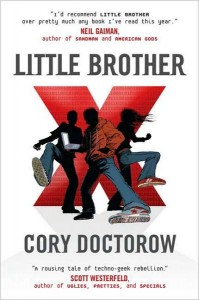 In the near future, with technology just a little more pervasive, teens have to go to extremes to get a little privacy from the Powers That Be. Unfortunately, one such attempt places Marcus and his friends at the site of a horrific terrorist attack, where they’re seized by Homeland Security and brutally, illegally held and questioned. Once released back into a city now under martial law, Marcus swears revenge for his unfair treatment, and begins an underground technological movement aimed at bringing down the people who abused him. He’ll find unlikely allies and potential betrayal around every corner as he builds an army of hackers and malcontents, all dedicated to changing or destroying the system. In this thought-provoking tale of techno-geek activism, Doctorow examines the role of technology and security and the government in our lives, and makes us reconsider just what we’re willing to put up with for our safety. Absolutely compelling, utterly fascinating, and just a bit frightening, I couldn’t stop reading this one
In the near future, with technology just a little more pervasive, teens have to go to extremes to get a little privacy from the Powers That Be. Unfortunately, one such attempt places Marcus and his friends at the site of a horrific terrorist attack, where they’re seized by Homeland Security and brutally, illegally held and questioned. Once released back into a city now under martial law, Marcus swears revenge for his unfair treatment, and begins an underground technological movement aimed at bringing down the people who abused him. He’ll find unlikely allies and potential betrayal around every corner as he builds an army of hackers and malcontents, all dedicated to changing or destroying the system. In this thought-provoking tale of techno-geek activism, Doctorow examines the role of technology and security and the government in our lives, and makes us reconsider just what we’re willing to put up with for our safety. Absolutely compelling, utterly fascinating, and just a bit frightening, I couldn’t stop reading this one
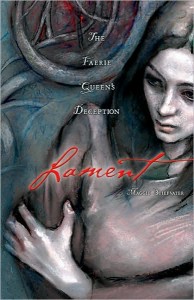
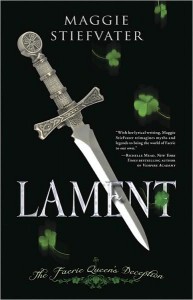 Deirdre’s ordered existence is thrown into turmoil when inexplicably magical things start happening around her, even as the mysterious, sexy Luke Dillon insinuates himself into her life. Their newfound romance takes a hit when Deirdre discovers she’s a cloverhand, possessed of strange powers and able to see Faeries, and that Luke is a Faerie assassin sent to control or kill her. Now they’re both caught up in a deadly game of political and magical machinations, one which will affect not just Deirdre, but her friends and family as well. Lament is a gorgeous, gripping tale highly reminiscent of Emma Bull, Holly Black, or Charles de Lint, full of magic, music, mystery and romance. With richly-developed characters and an excellent take on the Fae, it makes for great reading. I absolutely loved this book.
Deirdre’s ordered existence is thrown into turmoil when inexplicably magical things start happening around her, even as the mysterious, sexy Luke Dillon insinuates himself into her life. Their newfound romance takes a hit when Deirdre discovers she’s a cloverhand, possessed of strange powers and able to see Faeries, and that Luke is a Faerie assassin sent to control or kill her. Now they’re both caught up in a deadly game of political and magical machinations, one which will affect not just Deirdre, but her friends and family as well. Lament is a gorgeous, gripping tale highly reminiscent of Emma Bull, Holly Black, or Charles de Lint, full of magic, music, mystery and romance. With richly-developed characters and an excellent take on the Fae, it makes for great reading. I absolutely loved this book.
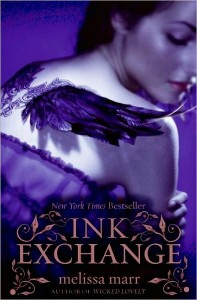 All Leslie wants is to change her life for the better, disgruntled by her problematic family and unsatisfying day-to-day existence. When she gets an beautifully intricate tattoo, she feels things are finally improving. What she doesn’t realize is that the tattoo has a magical significance, and she’s being drawn into a complex power struggle between several of the Faerie Courts, used as a pawn to harvest mortal energy for the Dark Court’s nourishment. With her life spiraling out of control despite her best efforts, her friends unable to fully protect or warn her of the dangerous, and several Fae battling for her affections, only Leslie can make the right choices, not just for her, but for the Fae who have invaded her life. A darkly rich tale of hard choices and seductive pleasures, of subtle magic and immortal creatures dwelling alongside unsuspecting mortals, Ink Exchange is a worthy follow-up to Wicked Lovely and a great story in its own right.
All Leslie wants is to change her life for the better, disgruntled by her problematic family and unsatisfying day-to-day existence. When she gets an beautifully intricate tattoo, she feels things are finally improving. What she doesn’t realize is that the tattoo has a magical significance, and she’s being drawn into a complex power struggle between several of the Faerie Courts, used as a pawn to harvest mortal energy for the Dark Court’s nourishment. With her life spiraling out of control despite her best efforts, her friends unable to fully protect or warn her of the dangerous, and several Fae battling for her affections, only Leslie can make the right choices, not just for her, but for the Fae who have invaded her life. A darkly rich tale of hard choices and seductive pleasures, of subtle magic and immortal creatures dwelling alongside unsuspecting mortals, Ink Exchange is a worthy follow-up to Wicked Lovely and a great story in its own right.
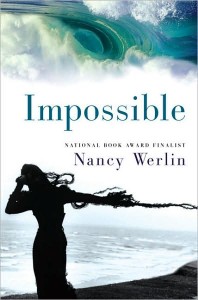
 When she turns seventeen, Lucy Scarborough becomes the latest woman in her family to fall victim to a centuries-old curse laid down upon them by an Elfin Knight. Now she has less than nine months – until her own daughter is born – to perform three impossible tasks, or else she’ll go mad, just like her mother and grandmother before her. Can Lucy succeed where previous generations have failed, even with the help of her friends and family? Inspired by the ballad Scarborough Fair, Impossible is an intriguing blend of romance and fantasy that doesn’t hesitate to touch upon serious issues such as rape and teen pregnancy. While it’s an excellent, compelling story, it has a few pacing problems, and the subject matter may not be appropriate for all.
When she turns seventeen, Lucy Scarborough becomes the latest woman in her family to fall victim to a centuries-old curse laid down upon them by an Elfin Knight. Now she has less than nine months – until her own daughter is born – to perform three impossible tasks, or else she’ll go mad, just like her mother and grandmother before her. Can Lucy succeed where previous generations have failed, even with the help of her friends and family? Inspired by the ballad Scarborough Fair, Impossible is an intriguing blend of romance and fantasy that doesn’t hesitate to touch upon serious issues such as rape and teen pregnancy. While it’s an excellent, compelling story, it has a few pacing problems, and the subject matter may not be appropriate for all.
